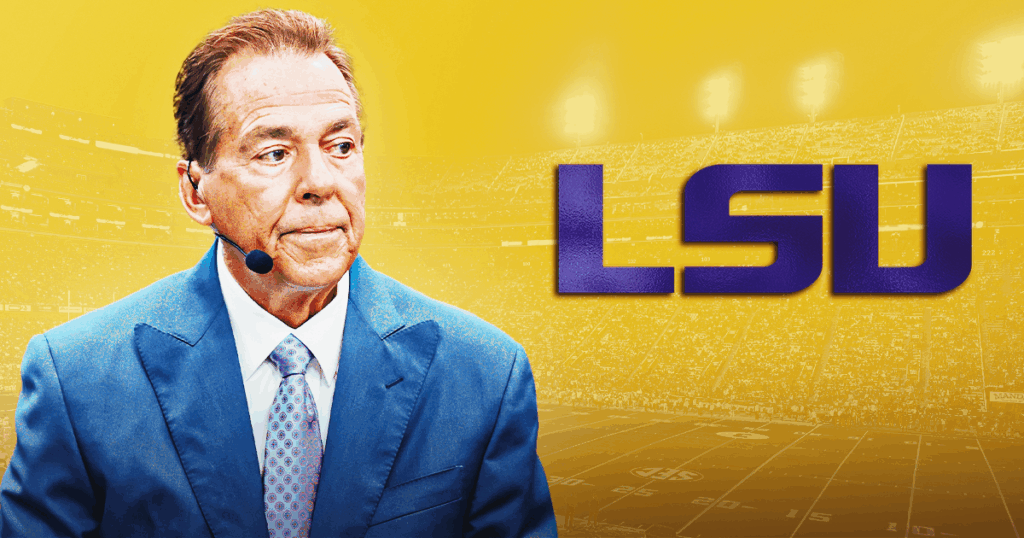Unlocking Premium: This article is now FREE
Get access to all premium content across the On3 | Rivals network for $1
BATON ROUGE, La. – My colleague at On3, Andy Staples, recently ranked the open head coaching jobs in college football, and he had LSU at the top of the list.
Immediately, I nodded my head in agreement and then took it a step further: Is there a claim to be made that LSU is the top job in the country – period?
“It’s in the top three, at the very least, no matter who you ask, and if somebody says it’s not, then they’re lying,” said former LSU All-SEC running back Jacob Hester, a captain on LSU’s 2007 national championship team and now the color analyst on the LSU Radio Network.
Full disclosure: Hester is LSU royalty. He wore the revered No. 18 jersey when he was fourth-and-automatic on Saturday night in Tiger Stadium, and he bleeds purple and gold. So, yes, he’s a bit biased.
So my next call was to somebody else who was once LSU royalty and still is if anybody on the Bayou is being honest. The same guy who won a national championship at LSU in 2003 and six more at Alabama before he retired following the 2023 season.
Nick Saban, as has always been the case in the two decades that I’ve known him, was brutally honest when I asked him about where LSU ranks in the pecking order of the best coaching jobs in America.
“That’s changed dramatically, the whole question of what constitutes the best job,” Saban told On3. “What used to make a job great was facilities, fan support, good academic support, recruiting base and being able to create value for the players. Now that has been minimized to how much money do you have to spend on building a roster.
“That is the most important thing by far.”
A lot of people forget that when Saban arrived at LSU in 2000, the Tigers had suffered through losing seasons in nine of the previous 11 years. At that point, nobody would have dared to argue that the LSU job was the best in the country.
“They just hadn’t figured out the institutional and political alignment at LSU until Saban got there, and he was savvy enough and strong enough to get that figured out,” one FBS athletic director told On3. “And once they did, look at the results. He got the ball rolling, and his handprints have remained on that program.”
Indeed, LSU has won three national championships under three different head coaches, going back to Saban winning the college football’s top prize in 2003. Les Miles won one in 2007, and Ed Orgeron won the Tigers’ most recent national title in 2019. Miles also led LSU to the national championship game in 2011 and an unbeaten regular season before losing to Saban and Alabama in a rematch in the title game.
To sum it all up, all three of Brian Kelly’s predecessors won national championships before he was fired on Sunday. He won nine or more games in all three of his full seasons at LSU and went to the SEC championship game his first season in 2022, but he was 4-6 in his last 10 SEC games, going back to last season, which was enough for the LSU brass to send him packing.
“It’s a place you can and should be able to win at the highest level every single year,” said one longtime coach who’s coached at multiple schools throughout the country, including LSU. “There’s a reason different coaches with different styles and different approaches have won there. A handful of other schools are in the same category as LSU — Ohio State, Alabama, Georgia, Michigan and maybe a few more.
“But LSU gives you the best chance of any job in America to get the quality of player it takes to win a national championship.”
That said, let’s get back to the guy who knows more about winning national championships than anybody. Not only did Saban win seven, but he lost three times in the championship game during his legendary career.
He’s also the first to admit that the game — and what a coach needs now to win at a championship level — has taken on a whole new identity.
And with Lane Kiffin being at the center of what’s sure to be a coaching carousel unlike anything we’ve seen in college football, Saban said what Kiffin has accomplished at Ole Miss is proof that this is the New World Order in terms of coaching jobs.
“Jobs that weren’t great jobs before are now,” Saban said. “Lane is the first name up for Florida and the first name up for LSU, but I think you can have a long debate on whether either one of those jobs is actually better than the job he has now because he has some guys over there at Ole Miss that give him pretty much whatever he wants from a roster standpoint. He may not necessarily have the same thing at Florida or LSU. So you look at these jobs differently now.
“Yeah, maybe you’ve got facilities. Maybe you’ve got money. Maybe you’ve got alumni who are passionate about football, but are they willing to invest what you have to invest now to win? Because a lot of people don’t believe in this shit.”
To be clear, Saban emphasized (for the umpteenth time) that he’s not against players being paid. It’s the system he thinks is faulty and not good for anybody, and ultimately has a major impact on what jobs are the most attractive. And, no, he hasn’t been tempted to get back into coaching.
“It’s not good for player development. I don’t know that it’s good for anything, just the direction we’re headed,” said Saban, voicing the same concerns his former Michigan State colleague, basketball coach Tom Izzo, did this week about former G League professional players committing to play for college teams.
“We’re letting G League players come play in college? Pretty soon, we’re going to have the New York Giants’ backup quarterback not getting enough development, so we’re going to send him to Penn State or somewhere else for a year to play. It’s crazy, absolutely crazy. Why not make these kids professionals, treat them like professionals and collective bargain the whole thing?”
In other words, it’s complicated and probably only going to get more complicated, and is anything but a slam-dunk for Kiffin or anybody else when they start weighing jobs.
Kiffin is not going to be swayed by money. He’s also not going to tip his hand, even with Ole Miss prepared to break the bank to keep him. He was adamant when talking with On3 recently that he will not allow what happened a few years ago, when Auburn was pursuing him, to happen again — a distraction that hovered over the entire program. His focus is this Ole Miss football team, which is 7-1, ranked No. 7 nationally and has a very manageable path to its first playoff appearance. It’s why Kiffin was open with his team last week before the road win over Oklahoma.
“I’m at a place in my life now where I’m appreciative and grateful for what I have and what’s right in front of me,” Kiffin told On3. “Anything that’s out there now about me is a compliment to what this team has done. That’s my only focus, this team. I’ll let everybody else deal with the what-ifs. I’ll deal in the present.”
Meanwhile, the hottest debate on social media is which job is better in this new era of football — the one Saban referenced — Florida or Ole Miss? And now, you throw LSU in the mix. It’s a debate that has spawned fights among media members, fans and warring factions on message boards and talk shows.
Two different coaches who’ve coached at multiple SEC schools told On3 that LSU being the “only show in town” in the state of Louisiana, combined with the fertile recruiting ground and commitment to high school football in the state, makes it a job rivaled only by Ohio State nationally.
“Almost all of those kids grow up wanting to go to LSU. There’s no in-state competition. It’s also a state that if you do your homework, you can flip up rocks and find great players that aren’t on all those damn lists,” the coach said. “The other thing is that it’s an old-school state. The coaching in high school is very good, and they coach them hard. You’re not getting a lot of soft players. Somebody’s gotten on their ass and yelled at them. They’re used to being coached hard. What you see in Georgia and Florida a lot of the time are kids moving into that state. They’re homegrown in Louisiana.”
Another coach said that the quality of talent in the state of Louisiana is one thing, but that the neighboring footprint makes it the best collection of talent in America.
“You’ve got the I-10 corridor into Houston to the west of you and then Mississippi to the east. Go look at the players who’ve come out of those regions,” he said.
In 2024, the state of Louisiana had the second-highest number of NFL players per capita, with one NFL player for every 80,306 residents. Texas was first overall in total NFL players a year ago, and Florida was second. Both states also have significantly larger populations.
“You’re also not fighting Florida State and Miami in Florida and every other school that wants to come down there, and you’re not fighting Texas A&M and Oklahoma in Texas,” one current SEC assistant coach said. “You gotta pay up if you’re going to win now, no question, but LSU is the envy of a lot of coaches because of the quality of talent in your front and back yard, and a lot of times, those kids are recruiting you if you do it the right way.”
Most of the best players in LSU history grew up in the state: Tyrann Mathieu, Kevin Faulk, Ja’Marr Chase, Malik Nabers, Odell Beckham Jr., Andrew Whitworth, Leonard Fournette, Glenn Dorsey, Dalton Hilliard, Devin White, Tommy Casanova, Bert Jones, Jerry Stovall and Billy Cannon.
“You have a stranglehold on the talent,” said Hester, who played at high school powerhouse Evangel Christian Academy in Shreveport. “There’s such a benefit in being the big dog in a state with this much talent. You’re not fighting Auburn if you’re Alabama or fighting Miami and FSU if you’re Florida. They don’t all end up at LSU, but if you want them, you pretty much get them from this state. I mean, there are some high schools that won’t even let you in the gym unless you’ve got a Louisiana tie because the loyalty to LSU is so strong throughout Louisiana.”
It’s no secret that Gov. Jeff Landry was right in the middle of Kelly’s firing last Sunday. He went on social media to second-guess the university’s decision to raise ticket prices after the ugly 49-25 loss to Texas A&M (or showing, as Landry dubbed it) in fabled Tiger Stadium. The place was scattered with empty yellow seats disguised as fans as the third quarter came to an end.
It’s a game that LSU led 18-14 at the half, and not even 24 hours later, Kelly was out as head coach.
Some might see the governor’s involvement as a hindrance, but one current FBS athletic director who’s worked at two different SEC schools said he sees it more as a plus.
“They might not admit it, but a lot of schools would love to have a governor that invested in football,” the athletic director said. “You don’t get that everywhere because if you do something for Alabama, for instance, then you have to do it for Auburn. I think you can get more done at a place like LSU because it’s the flagship school, and it’s obviously important to that governor that they’re good in football. That’s more of a pro than a con.”
Many believe it was then-Gov. Bobby Jindal who saved Miles at the end of the 2015 season. Jindal publicly supported Miles, who was hanging by a thread going into the final game of the season against Texas A&M. After halftime, then-president F. King Alexander gathered with some LSU Board of Supervisors and athletic director Joe Alleva and decided to keep Miles, who would have been owed $15 million had LSU fired him. LSU won 19-7, and Miles was then fired four games into the next season.
One industry source noted that when comparing LSU and Florida, LSU has been quicker to pull the trigger on coaches.
“Florida gave Billy Napier a chance, stuck behind him maybe longer than some wanted, but gave him a fourth season to get it right even though he didn’t,” the source said.
Hester countered: “Florida is about to have its third losing season in four years. If that happened here, this place would be burned down to the ground. The expectations are what they are here, and the best coaches are going to want that.”
How it all shakes out remains to be seen. Florida, LSU and Penn State are all top-10 jobs, no matter how many people you poll, and there’s a chance Auburn and Florida State could also come open. Kiffin was FSU’s top target had Mike Norvell left for the Alabama job in 2023. And if Kiffin were to leave Ole Miss this time after six seasons in Oxford, that’s going to be an attractive opportunity for somebody else, given what he’s done, and just as importantly, what Ole Miss has done to make football a priority.
After all, it was just this season that LSU stepped it up financially and reeled in the top-rated portal class in the country and spent around $18 million on its 2025 roster, which still pales in comparison to the money the likes of Texas, Ohio State, Oregon and Texas A&M spent.
“It gets down to not just who has the money, because a lot of these traditional schools have people who have money, but who’s going to spend the money to get these players and how long are they willing to keep spending it,” Saban said. “That’s the truth of it, whether me or anybody else likes it.”


